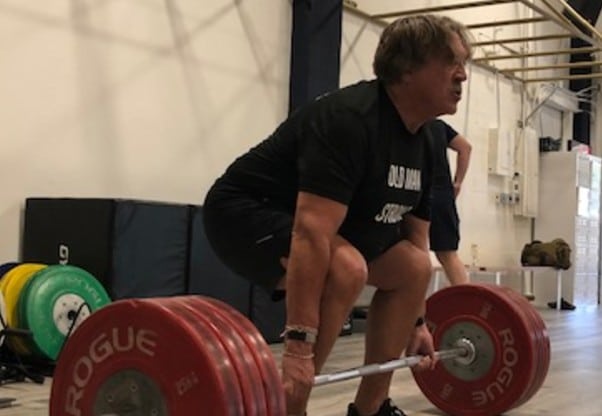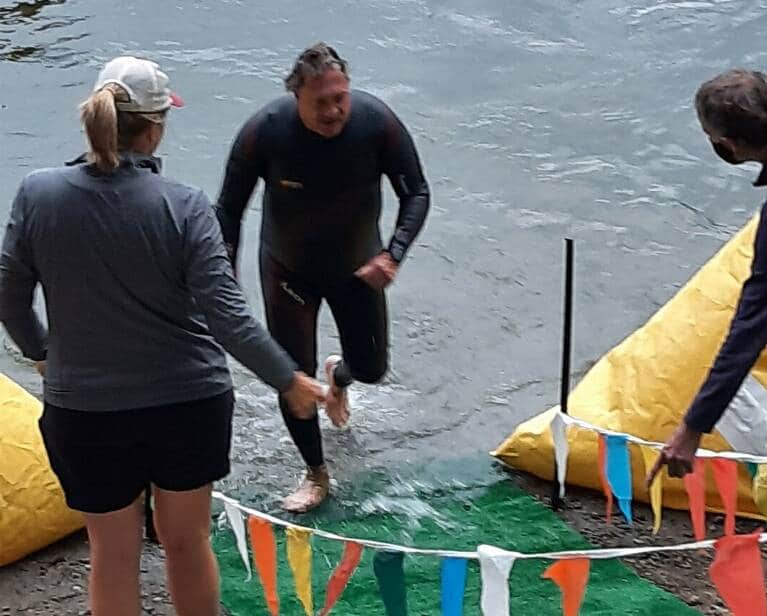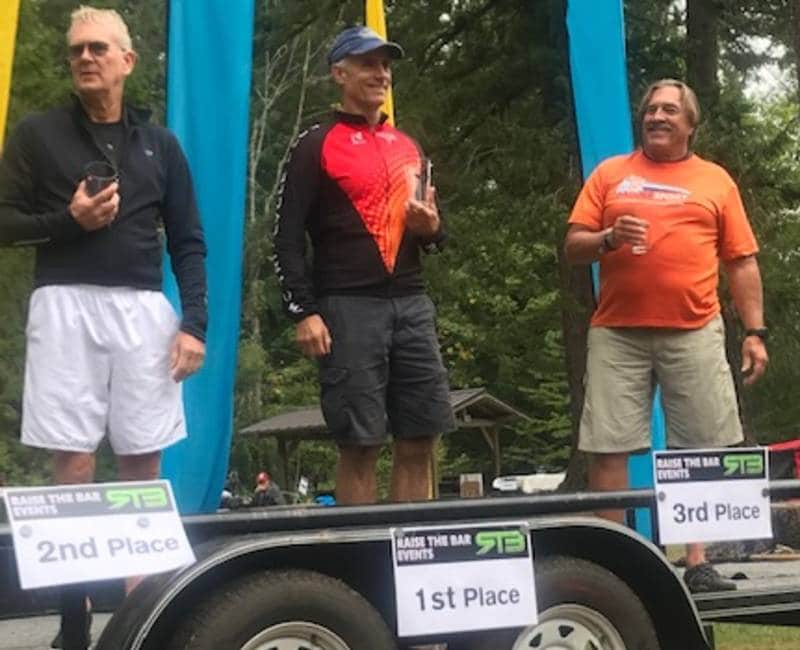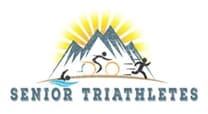An Unlikely Triathlete – Craig Cross’s Story

Is there certain experience you must have as a senior before competing in your first triathlon?
According to Craig Cross, his Scottish ancestry makes him much more likely to be weightlifting than running. Furthermore, before his first triathlon, Craig had only biked – a little. That’s it.
The one-two punch of genealogy and inexperience made Craig an unlikely triathlete. However, through persistence, a knowledgeable coach, and the support of new friends, he is now an Ironman triathlete.
Craig Cross Before Triathlon
While his peers were playing sports in high school and college, Craig Cross was in Alaska fishing commercially. This experience launched him into a lifelong career in fishery management which he continues today as an advisor to fisheries.
However, after pouring himself into work for more than four decades, Craig realized at age 60 that he needed to lose some weight. On top of this, he was finding everyday tasks, like getting dressed and tying his shoes, to be uncomfortably difficult.
“I joined a Crossfit gym near my home in Seattle, Washington. I began to work on improving my balance and building core strength” Craig told me. “And, boy, was it difficult. So difficult that for the first six months, I literally crawled off the gym floor and pulled myself onto a couch at the end of each workout.”
But he stuck with it. Over the next three years, Craig saw his balance improve, core become stronger, and overall fitness grow.
First Triathlon At Age 61
After about a year of Crossfit, Craig, then 61, decided to do the Whidbey Island Triathlon near his home west of Seattle.
Craig signed up for the triathlon despite having never learned to swim. He told me “I put on a wetsuit for the first time for this race. About midway through the swim, I felt so constricted by the wetsuit, that I stopped and pulled it halfway down. I dog-paddled and side-stroked my way to the end.”
Since he had biked a bit in his 40s, Craig was able to complete the bike leg without any problem. He finished his first triathlon by walking the run leg of the triathlon. Even though he crossed the finish line “dead last”, Craig Cross was officially a triathlete, a senior triathlete at that.
Learning to Swim
For the next three years, Craig continued to exercise. He did two or three sprint triathlons per year. However, he wasn’t making the kind of progress he had expected.
Craig said “I still couldn’t swim. I was still walking the run. I was finishing last or near last in all of the triathlons”.
“So, I joined a triathlon team. I joined a Masters Swimming class. And, I continued to lift weights.”
Reflecting on learning to swim in the Masters swim class, Craig said “I started out in the kiddie pool. The instructor, Kainoa Pauole, taught me how to side breathe and breathe under water. She also taught me a proper swim stroke.”
“I quickly realized that Kainoa understood my needs as an older athlete.”
Taking It To The Next Level
After competing in triathlon for about five years, Craig decided that he wanted to do a half Ironman triathlon.
The first step was to hire Kainoa as his triathlon coach. According to Craig, “Since Kainoa understood my unique needs, she brought me along slowly, over a year and a half, to avoid injury.”
Coming to coaching with a masters degree in kinesiology and exercise science; experience as a college swimmer, triathlete, and marathon runner; and specific training in triathlon coaching, Kainoa made all the difference for Craig.
“The key for my training, and I believe it applies to older people in general, especially those new to the sport, was to start by getting my body ready for triathlon. I started by strengthening my core. I also built up the muscles around my knees and hips. After awhile, I started to swim consistently with the Masters team. Then, finally, I began to run.”
Craig’s Advice On Training For Senior Triathletes
Craig has now completed over 20 triathlons, including 17 sprints and four Olympic distance triathlons. In April, 2021, Craig completed his first Ironman 70.3 in Des Moines, Iowa. Not stopping there, Craig is scheduled to compete in the Victoria, British Columbia, Canada Ironman 70.3 on May 29, 2022.
Given where he started from, Craig Cross is worth listening to for advice on training, especially if you are not sure you can complete a triathlon.
“If you are serious about keeping going with triathlon as a senior, join a club and hire a coach, especially if you are doing longer distance races.”
Craig Cross, Ironman triathlete
Use Other Senior’s Experience With Triathlon
During most of the year, when preparing for a sprint or Olympic triathlon, Craig trains six days and rests one day each week. Some of the time he trains with the triathlon club or Masters swim team and other times he is on his own.
A typical training week includes two open water swims, two bike rides of 20 to 30 miles each, a 5 km run on one or two days, and one 10 km run. Craig also lifts weights two days per week.
Being part of a triathlon club and Masters swim team has been invaluable.
“It may sound strange for someone in their 60s, nearly 70, to say they are being mentored. But that is precisely what one of the guys on the triathlon team is doing. This man, who is in his 70s and doing full Ironman triathlons, has helped me understand the importance of recovery.
“Recovery is important for triathletes in general. However, for seniors, recovery is a HUGE deal. Recovery takes longer with age.
“This gentleman also holds me a little bit accountable. For example, if I miss an open water swim, the next time I show up he will ask ‘Where were you last time?’
“Being part of a team is one key to progressing and continuing in triathlon.”

Hire a Coach With the Right Experience for Longer Distance Triathlons
The second key to competing in triathlon as a senior is to hire the right coach, especially for longer distance (half and full Ironman) races. Craig emphasizes the need to have a coach, like Kainoa, who understands the unique needs of the older athlete.
Craig now hires Kainoa as his coach for the six months before a longer distance race. During other times, Craig trains using the schedule of the typical training week described above and competes in sprint or Olympic distance events.
“Kainoa develops a schedule in TrainingPeaks that helps me build endurance. While I am not fast, I am ‘forever’.
“Kainoa’s plan gives me a range of heart rate to stay within during the bike and the run. She monitors my heart rate, my cadence on the bike, and how I am feeling during each workout. With this information, she will adjust the schedule, sometimes adding another rest day and sometimes ramping up my training.
“About six months before the Des Moines triathlon, she also had me train my body to take food and electrolytes during workouts, something I would need to do during a race.
“Kainoa’s monitoring continues until I start tapering a couple of weeks before the race. It holds me accountable. Besides, her involvement also protects me from overtraining.”
How Triathlon Has Benefited Craig Cross and His Family
Craig has found triathlon to offer benefits beyond the physical ones. Some of these are included in our “15 Reasons for Those 50 and Older to Do Triathlons“.
Here are the top additional benefits for Craig:
- Challenges him mentally by pushing him to learn new skills. There are technical aspects of each of the three sports that are interesting to study.
- The variety in swimming, biking, and running as well as weightlifting keeps training fresh.
- Motivates family members. Seeing their father and grandfather push himself physically and mentally, even in his late 60s, has inspired family members to stay active and take on new challenges. Craig recently did a triathlon with his son, grandson, and daughter.
From An Unlikely Triathlete to Ironman
During our conversation, Craig repeatedly told me “I am not an athlete”. Of course, his story says otherwise.
What has been the secret to Craig’s achievements in triathlon? According to his coach, Kainoa Pauole, it is dedication, discipline, and consistency in training.
“Craig is a dedicated and disciplined athlete. I know he is a busy guy with work and his family responsibilities but he still remains so consistent with his training. All of his hard work has paid off as he has found great success in our sport.”
Notice that there is nothing Kainoa said about having experience or exceptional skill in one or more of the sports of triathlon. If that doesn’t encourage you to take up the sport – so long as your doctor concurs – I’m not sure what will.

It’s Your Turn
Many who get involved in triathlon come with experience in one or more of the three disciplines of swimming, biking, and running. However, as Craig Cross proves, this is not required. You can become a triathlete after age 60 even with limited experience in the three sports.
A significant number of readers of SeniorTriathletes.com are in a situation similar to Craig’s when he first thought about doing a triathlon. You are not sure how to, or even if you should, jump in and give the proverbial ‘tri’.
Craig Cross and scores of others age 50 and over have proven that you can do a triathlon later in life. You can also learn to swim and run after age 60.
And, with consistency, it is even possible to “become faster and go farther” with age. This, despite the common wisdom that we only decline with age.
What’s keeping you from tri-ing? Share your questions and comments for Craig below.
Comments: Please note that I review all comments before they are posted. You will be notified by email when your comment is approved. Even if you do not submit a comment, you may subscribe to be notified when a comment is published.
